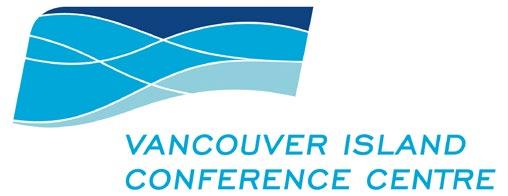2022 College of Applied Biologists ANNUAL REPORT



Our Vision
Responsible resource management supported by accountable and trusted professionals.
Our Mission
To serve the public interest by regulating applied biology professionals.
Our Values
• Collaborative: We build relationships with others to protect the public interest.
• Accountable: We are responsive and open in our relationships with the public, employers and College registrants.
• Respectful: We value Indigenous Knowledge in the management and protection of natural resources.
• Ethical: We follow the principles of administrative justice and take a fair, transparent and judicious approach to the application of College processes.


It is hard to believe we are a year since our last conference and the monumental return to in-person events. The College of Applied Biologists continues to lead the way through the implementation of the Professional Governance Act and strengthen many aspects of our regulatory approach, including the newly implemented Indigenous Awareness course and a new Code of Ethics and Professional Conduct course.

We continued engaging with our registrants to better refine and define reserved practice, which included the development and circulation of informative illustrative documents that not only serves to inform our registrants of this crucial shift in regulation, but also serves to inform governments, industry, and the general public of the rights and responsibilities that
professionals regulated by the College must uphold.
deThroughout the summer of 2022, the College hosted numerous webinars that were well-attended by registrants, employers from industry, government and non-government organizations, which presented and discussed the path to reserved practice. If you or someone you know is interested in better understanding what reserved practice is and the implications to their practice, the webinar remains available on the College website.
An important task ahead for the College Staff, Board members and volunteers is the development of necessary
Alexandra
Jong Westman, RPBio, President/Chair of the Board/Council
The College continues to lead the way through the implementation of the Professional Governance Act and strengthen many aspects of our regulatory approach.
practice guidance documents; currently under development is one for sediment and erosion control. These guiding documents are critical to our collective practices, so that we all appreciate the limitations of our practice and when other professional’s input is required. The College could not accomplish all these necessary tasks without the dedicated team of Staff and volunteers, and it is truly an honour to have worked with every single one. As I transition into the role of Past President/Chair, after serving on the College Council (now Board) since 2015, I reflect on all the changes that have occurred, the growth and maturation of not only the College but of the regulation of professional practice
across BC. My time with the College has been ever so rewarding, and I encourage every registrant to consider getting involved in a Committee, a Task Force, or even the Board itself. The College has such an extraordinary diversity of registrants because the practice of applied biology is such an exquisitely pluralistic field and you all should know that it is this richness that has informed our path forward.
Submitted by Alexandra de Jong Westman, RPBio, President/Chair of the Board/CouncilThe College could not accomplish all these necessary tasks without the dedicated team of Staff and volunteers, and it is truly an honour to have worked with every single one.
We did it. On September 1, 2022, the regulation giving applied biologists reserved practice went into effect, making British Columbia the first jurisdiction in the world to recognize that there are areas of resource management that are reserved for professional applied biologists. This landmark achievement was the culmination of five years of work and a realization of concept envisaged nearly 40 years ago, when applied biology professionals originally founded an association in BC.
> Developing a compliance plan to provide information on reserved title compliance and enforcement activities, and on how reserved practice will be enforced,
Christine Houghton, Chief Executive Officer
> Finalizing and approving bylaw amendments on scope of practice for the Registered Biology Technologist (RBTech) and Applied Biology Technician (ABT) registrant categories,
A significant amount of work went into making sure that not only reserved practice went into effect, but when it did, there was a broad and clear understanding of what that practice is and what it is not. Using the published illustrative materials as the base line communication tool, the College delivered several in-person and virtual information sessions reaching over 1000 individuals. Registrants, employers, regulatory partners and members of the public were all invited to attend. That work is on-going.
> Development of a legal definition and framework for the new registrant category of Limited Licensee for applied biology practitioners,
> Developing and implementing registration pathway for prospective Limited Licensees.
As well, the College advanced other critical strategic initiatives to help ensure successful implementation:
2022 also saw progress on collaborative initiatives with our regulatory partners. Key initiatives include the crossagency Erosion and Sediment Control Professional Practice Guidelines—currently under development—, establishment of the Environment Practice Panel with the Forest
Professionals BC and significant progress on understanding alignments and intersections between professions. Most notable of this is a signed collaboration agreement with Engineers & Geoscientists of BC.
and discipline process; and delivering a merit-based candidate search for registrants to run for the College’s governing Board.
There was also the launch of the Indigenous Awareness Course for all registrants, with a Legal Requirements Course for new registrants well underway. These strategic initiatives were accomplished with the backdrop of the College’s fulfilling its ongoing core mandate. This included evaluating and processing record numbers of applications for registration with the College; completing the annual audits of 3% of eligible registrants; implementing the Practice Review Program; maintaining a robust and respectful complaints
A lot has been accomplished in a relatively short period of time, and we should all take the time to celebrate those accomplishments―but there is more to do. The College of Applied Biologists remains committed to striving for excellence in professional regulation and to continue to work collaboratively with our regulatory, government, academic and training partners to improve processes, policies and programs that enhance our ability to protect the public interest.
Submitted by Christine Houghton, CEOA lot has been accomplished in a relatively short period of time, and we should all take the time to celebrate those accomplishments.
As the provincial government appointees (Lay Councilors/Board Members) on the College of Applied Biologists governing body, we play a critical role in ensuring that the College maintains its focus on protecting the public interest. It is both an honour and a responsibility we take very seriously.

2022 was an important year for the College and its registrants as it realized the goal of reserved practice for applied biology professionals. This landmark achievement is one we believe is vital to sustainable resource management, which is absolutely in the public interest.
Act that have strained the resources of the organization. This included a review of processes and programs as per the Office of the Superintendent of Professional Governance’s (OSPG) Standards of Good Regulation, the implementation of a mandatory Indigenous Awareness course and a revision of the College’s bylaws to come into compliance with the revised PGA as a few examples.

Reserved practice was not the only achievement in 2022. As with all regulatory bodies governed by the Professional Governance Act (PGA), the College has new requirements under the


As lay Councilors/Board Members, we have been involved in all of these activities whether as members of Council/ Board and as Chairs and/or participants on governance committees or taskforces such as Finance, Conference Planning and Mandatory Training.
It has been an exciting year, and we look forward to continuing to support the College in fulfilling its mandate.
Content to be included in AGM Report:
December 31, 2022, with comparative information for 2021
The College continues to maintain a strong financial position with a healthy balance sheet. Applications and subsequent registrations for all designations continue to see growth with Registered Professional Biologists (RPBio) increasing by 5.9%, Registered Biology Technologists (RBTech) by 13%, and Biologists in Training (BIT) up 9.5%.
Expenditures continued to be impacted by the pandemic albeit less significantly than in the previous two years with the cancellation of a few in-person meetings at the beginning of 2022. As with other employers, the College was also affected in its ability to recruit for funded positions resulting in salary savings. Surplus dollars were invested in the legal and operational contingency funds through an inter-fund transfer.
Financial pressures resulting from added requirements in the Professional Governance Act , increased public expectations and compliance actions to enforce title and practice rights will continue to grow for the foreseeable future.

Year End December 31, 2022, with comparative information for 2021
The Annual Report contains a summarized version of the financial statements. The full audited statements are available on the College’s website.
Mark De Croos Chair - Finance Governance Committee Christine Houghton Chief Executive Officer
The Finance Governance Committee provides oversight of budget development, monitoring and financial audit.
In 2022, the Nominations Committee continued to deliver a fair, transparent and impartial elections system in compliance with the Professional Governance Act. The 2022 election again used the College’s registrant portal to allow all registrants to easily exercise their voting rights.
The committee adopted the following improvements to the nominations process that had been recommended from the previous year:
> Appointment of Nominations Committee at the June Council meeting to allow more time to contact potential nominees.
Four registrant members of the committee and the Chair were appointed in June 2021. The committee began its work in October 2021 after having had a Lay Committee member appointed. The Committee reviewed the College Council’s June 2021 self-assessment to execute a gap analysis and identify desirable competencies for potential nominees. The committee provided its final report to Council in June 2022, where it was approved. Voting in the 2022 Council elections occurred from February 24 to March 25, 2022.
> Using Nominations Committee as a vehicle to suggest other volunteer opportunities with the College when soliciting prospective nominees.
> Improving the platform for document sharing by using the College registrant portal.
2022 Nominations Review
> 26 registrants contacted.
> Seven applications received.
> Seven nominees qualified by the Committee for the ballot.
The Nomination Committee’s work includes communicating vacancies, identifying competencies, conducting a gap analysis of identified competencies and assessing potential nominees via a written application, interviews and verification of references.
Elections Review
> 537 ballots cast.
> 22 per cent voter participation out of 2466 eligible voters.
> The College Register had 3221 registrants (as defined by the Professional Governance Act) and 59 Student Biologists as of December 31, 2022.
> There was an increase of 249 College registrants and 4 Student Biologists in 2022 from 2021.
> RPBios make up the vast majority of registrants, 77%, with BITs being the next biggest registrant category at 16%.
> There was an increase in RBTech, ABT and RBTech in Training registrants in 2022 from 2021. RBTechs, ABTs and RBTechs in training went from 113 to 128, 20 to 27, and 46 to 58 respectively.
2012 - 2022 Register History
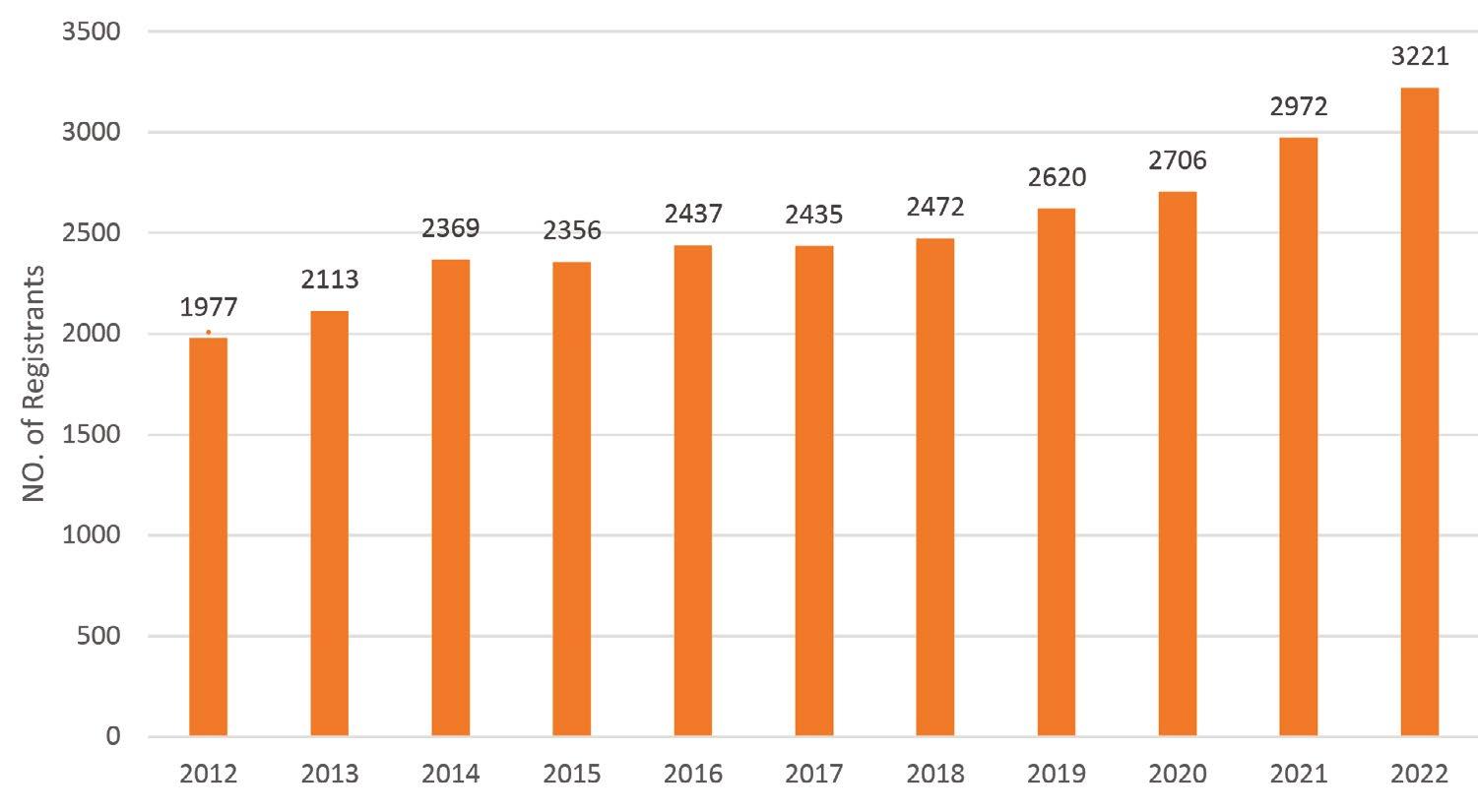
> In 2022, the College received a combined 761 completed applications for all six categories 1) Apply to Join, 2) Reclassify (e.g., BIT to RPBio, ABT to RBTech), 3) Reinstate, 4) On Leave, 5) Retire and 6) Resign.
> In 2022, the majority of applications the College received were for new registrations and for registrants to reclassify. Compared to 2021, there was an increase in the number of applications to reinstate. A total of 344 applications to join, reclassify, or reinstate were received for practicing registrant categories (RPBio, RBTech, ABT and AB-LL), and 276 applications to join, reclassify, or reinstate were received for in training registrant categories (BIT, RBTech in Training, and ABT in Training).
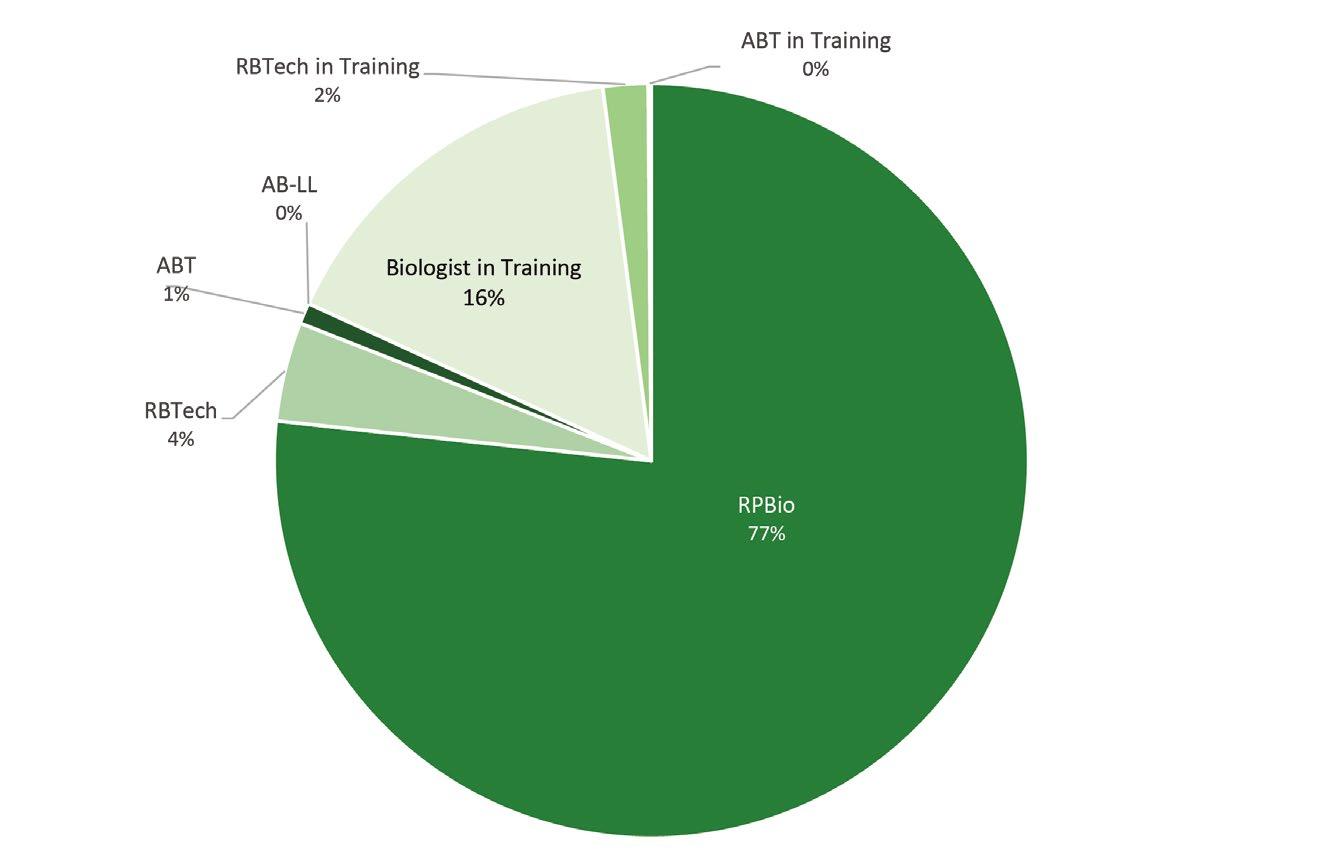
Percentage of College Registrants as of December 31, 2022.
54 audits were completed. 53 were found to be compliant and one was found conditional and required the registrant to undertake remedial measures.
In 2022, the College undertook its first practice review. A practice review is initiated when a deficiency is identified in a registrant’s practice. It further reviews the deficiency and prescribes measures to correct deficiencies in the registrant’s practice.
Number of audits by year 2016–2022.
Note: For 2021, 3% of total registrants were selected. This was an error as 3% of the eligible registrants should have been selected.
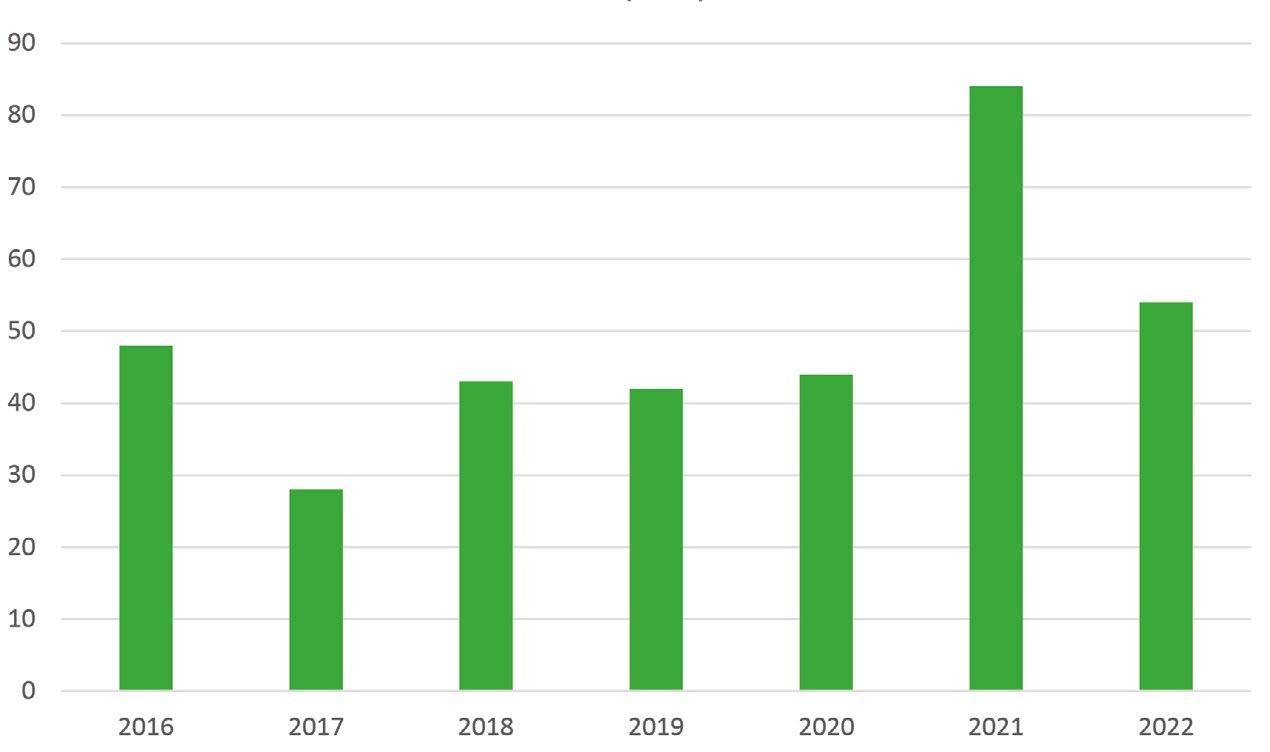
> The College received 6 complaints in 2022.
> One citation as per section 9-8(1)(d) of the College Bylaws was issued by the Investigations Committee in January 2023 against a registrant from a complaint received in 2021.
> One complaint received in 2021 was deferred until an external investigation by another regulator was concluded as per the College Bylaws section 9-11(1).
> Five complaints were dismissed by the Registrar as per section 9-5(1) of the College Bylaws.
> Four Complaint files were carried over from the 2021 fiscal year to the 2022 fiscal year. Reasons for the carry over included submissions late in the fiscal year and ensuring a fair, transparent and due diligence process.
Complaints received by year.
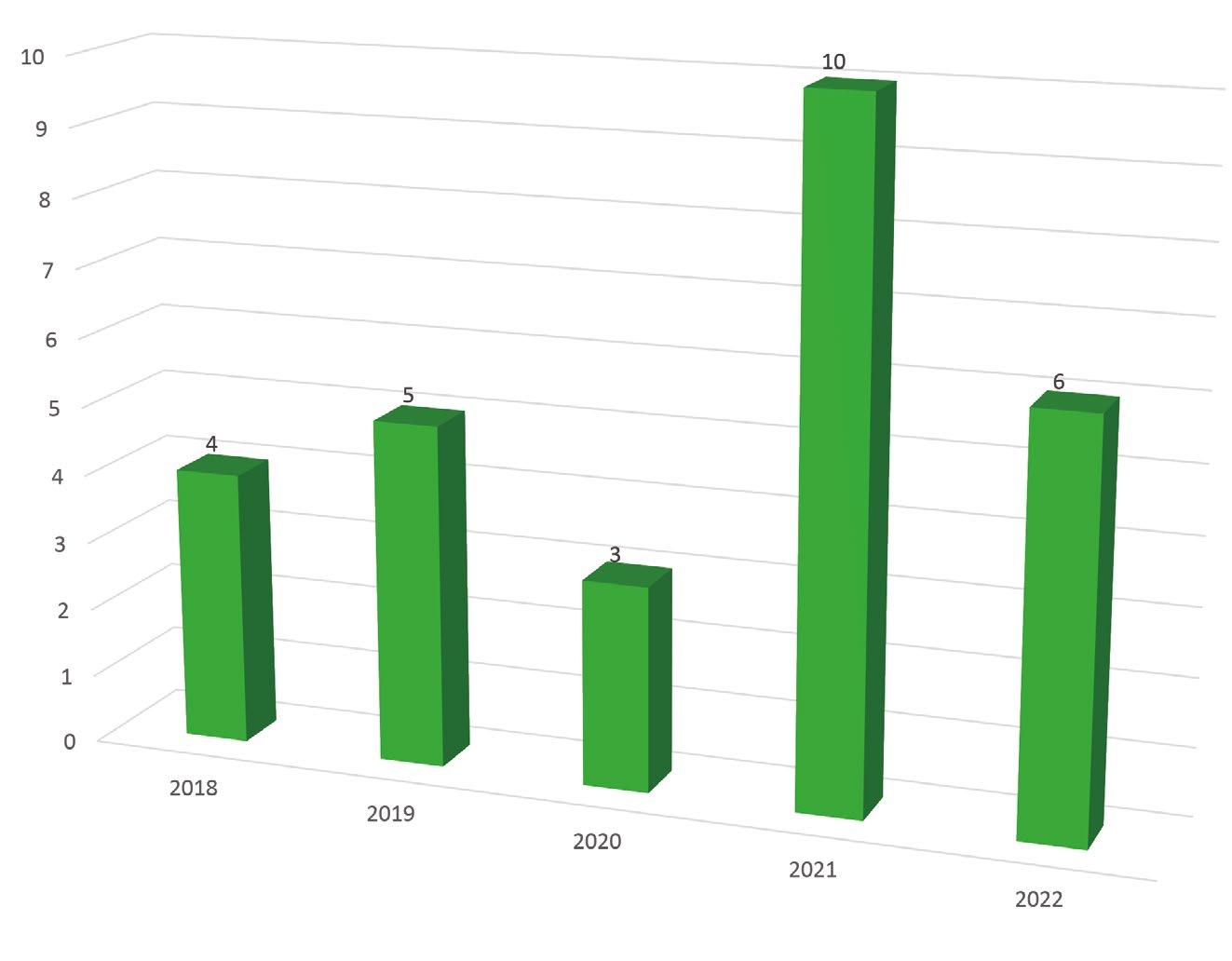
The results of the 2022 complaint files reviewed by the Investigations Committee and the Registrar are published in the Discipline Digest. Any current or past citations and hearing results are posted on the College’s website. The below graphs show the number of complaints received and the summary of complaint outcomes from 2012 to 2022.
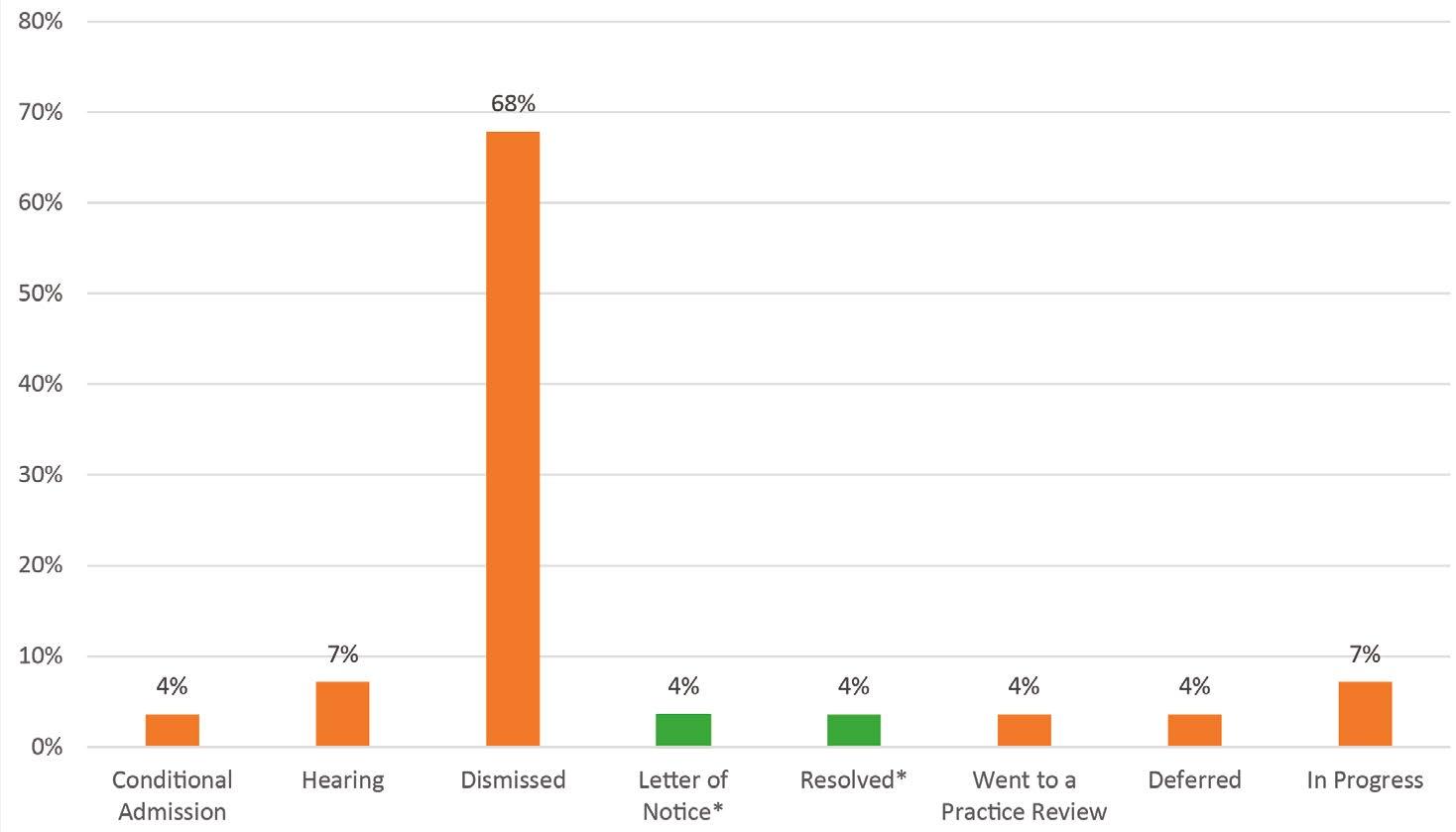
Summary of complaint outcomes from 2012 to 2022.
Note: *These were options under the College of Applied Biology Act & College Rules and not options under the Professional Governance Act (PGA). Conditional Admission under the PGA includes a Reprimand or Remedial Action by Consent (RRAC), Consent Order (CO) or Alternationve Complaint Resolution (ACR).
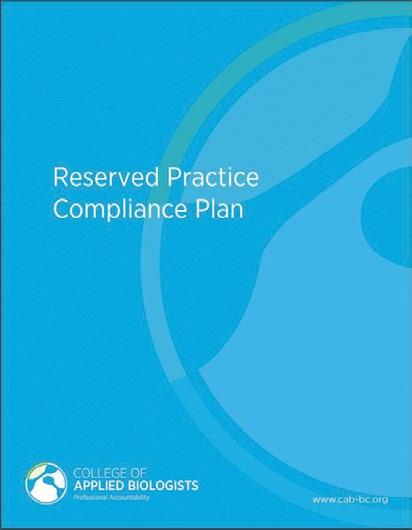
On September 1, 2022, reserved practice came into force for Registered Professional Biologists and Registered Biology Technologists as the Applied Biologists Regulation was fully enacted. This was a historic achievement that made British Columbia the first jurisdiction in the world where applied biologists have reserved practice.
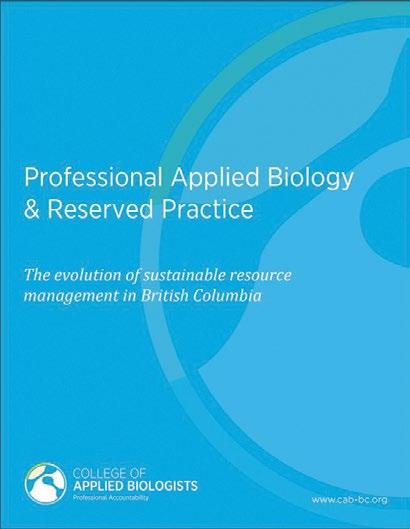
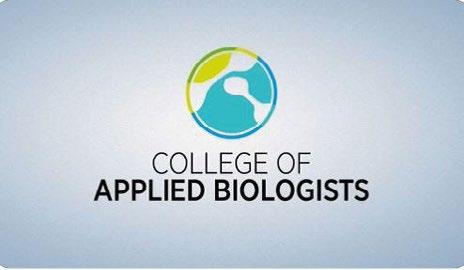
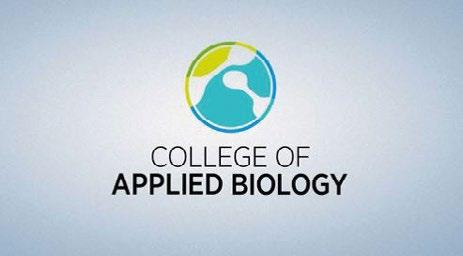
As per the College bylaws, the College changed its name to College of Applied Biologists on April 1, 2022. The change in name was to align the College with its Regulation, the Applied Biologists Regulation.
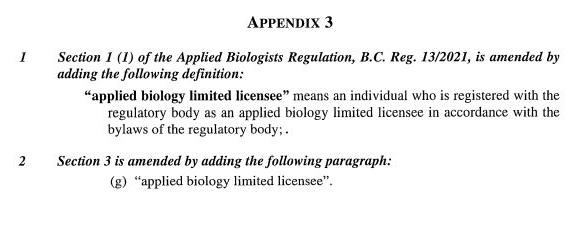
The Applied Biologists Regulation was amended on September 26, 2022 via Order-in-Council
482/2022 to include Applied Biology-Limited Licensee (AB-LL) as a protected title and to recognize that the AB-LL designation has reserved practice.
The College’s mandatory training course in Indigenous Awareness was available for registrants to complete as of on May 3, 2022. The Indigenous Awareness course was developed by Indigenous Corporate Training and selected by the College’s Mandatory Training Task Force. Registrants were also required to complete the new Code of Ethics and Professional Conduct course.
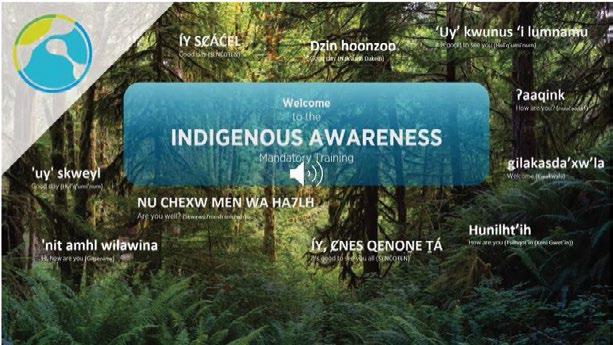
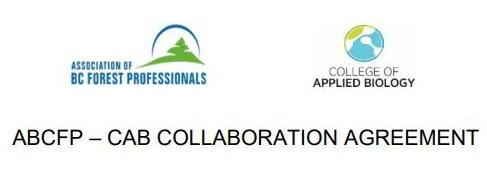
The College signed a collaboration agreement with Engineers and Geoscientists BC. This agreement helps define the relationship between the two professional regulators and their 3 professions – engineering, geoscience and applied biology – and how we will work together.

The Association of BC Forest Professionals (ABCFP) (now Forest Professionals BC - FPBC) and the College of Applied Biologists (CAB) signed a collaboration agreement to form an Environmental Practice Panel (EPP). The purpose of the EPP is to provide recommendations that promote and enhance collaborative relations between FPBC and CAB and collaborative practice between forestry and applied biology professionals in a manner that protects the public interest.
Starting for the 2023 dues cycle, registrants need to verify their identity with the College. This procedure was approved by the College Council.
Identification verification is done securely through the College portal and consists of confirming name, date of birth and valid government-issued ID.
Readership and Click %




